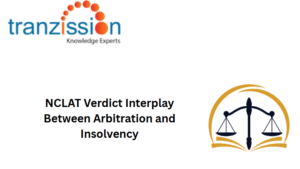
The Role of Arbitration in Insolvency
Table of Contents
Arbitration and insolvency laws clash due to their fundamentally different approaches to resolving any legal issue. While insolvency aims to centralize debt resolution by managing all claims against an insolvent company in court, Role of Arbitration in Insolvency promotes decentralized dispute resolution through private tribunals. This creates a potential conflict when both processes are involved, especially when a company is undergoing insolvency proceedings while having existing arbitration agreements. Therefore, legal practitioners and businesses operating in India need to navigate this interplay to ensure the proper resolution of all parties involved in a case.
Understanding Arbitration in the Context of Insolvency
What is Arbitration?
Arbitration is a form of alternative dispute resolution, where parties to a dispute agree to submit their disagreement to a neutral third party, the arbitrator, who will make a binding decision on the matter, essentially resolving the dispute outside of a traditional court system. It is a consensual and effective method of resolving commercial disputes.
Read more: Section 7 of IBC – Insolvency and Bankruptcy Code
How Insolvency and Arbitration Intersect
When a company facing insolvency proceedings has an arbitration agreement with a creditor, there are conflicts between insolvency laws and arbitration. Insolvency proceedings aim to resolve collective disputes and protect creditors’ rights, while arbitration resolves contractual disputes between parties. Hence, there is a growing need to reconcile arbitration agreements with insolvency law to ensure efficient resolution of overlapping issues.
The Role of Arbitration in Insolvency
Arbitration can act as a tool to resolve individual creditor disputes in insolvency proceedings, including:
Resolving Contractual Disputes:
Arbitration is often used to resolve disputes arising out of commercial contracts during insolvency proceedings. It can be particularly beneficial when dealing with cross-border insolvency cases as it streamlines the resolution process.
Addressing Cross-Border Insolvency Issues:
The neutrality and enforceability make arbitration a preferred mechanism in cases involving parties from multiple jurisdictions. It offers a more efficient and flexible alternative to traditional litigation in multiple courts.
Bridging Gaps in Jurisdictional Conflicts:
The cross-border insolvency framework in India under the Insolvency and Bankruptcy Code, 2016 (IBC) increases conflicts regarding the jurisdiction in such matters. With the flexibility of arbitration may be able to resolve jurisdictional conflicts between creditors, debtors, and insolvency administrators from different legal systems.
Read more :Role of ESG in Corporate Governance
Advantages of Arbitration in Insolvency Disputes
Arbitration can be an effective way to resolve insolvency disputes as it is flexible, efficient, and can be customised to the needs of the parties involved:
Neutrality and Expertise:
Arbitration provides a neutral forum where parties can present their case without the involvement of the courts. Parties can choose arbitrators with the relevant expertise to decide their dispute. For instance, in commercial law, the arbitrator may have expertise in the relevant legal matter.
Speed and Flexibility:
In arbitration, parties can design the resolution process that meets their needs. This efficiency is much faster than traditional court proceedings, particularly in time-sensitive insolvency matters.
Enforceability of Arbitral Awards:
Under the Arbitration and Conciliation Act, of 1996, the New York Convention ensures the global enforceability of arbitral awards. Thus making it a valuable tool for cross-border insolvency cases.
Challenges in the Arbitrability of Insolvency Disputes
Though the incorporation of arbitration in insolvency proceedings will be beneficial for companies facing financial distress, there are also challenges, such as:
Arbitrability of Insolvency-Related Matters:
The arbitrability of insolvency-related matters depends on the nature of the dispute and the stage of the insolvency proceedings. There is constant debate on whether ‘core’ matters of the process will be non-arbitrable. As insolvency is seen as a matter of public policy, it is handled exclusively by courts, while arbitration is primarily a private contractual mechanism, thereby creating conflict over jurisdiction.
Conflicts Between Arbitration Agreements and Insolvency Law:
Legal disputes may arise when arbitration clauses in contracts clash with insolvency proceedings. For instance, in Indian Oil Corporation Ltd. v. Arcelor Mittal Nippon Steel India Ltd., the Court ruled that the claims could not be referred to arbitration because they were extinguished by an insolvency resolution plan.
Enforcement Issues:
Enforcement issues arise due to conflict between the private, confidential nature of arbitration and the centralised, transparency of insolvency proceedings. Further, in insolvency proceedings, creditor claims are subject to verification and ranking based on priority, which may complicate the enforcement of an arbitration award against the insolvent party.
Global Trends and Legal Frameworks Supporting Arbitration in Insolvency
There are statutes in other countries which allow parties to have a lot of freedom in how they resolve disputes. For instance, Singapore, the United States (US), and the United Kingdom (UK) are considered arbitration-friendly jurisdictions. Singapore is a global hub for arbitration and dispute resolution. Their courts are known for being impartial and supportive of arbitration, through the Singapore International Arbitration Centre (SIAC). The UNCITRAL Model Law on Cross-Border Insolvency is designed to assist States in equipping their insolvency laws with a modern legal framework to more effectively address cross-border insolvency cases. It facilitates arbitration by providing a framework for cooperation between jurisdictions.
The Future of Arbitration in Insolvency Disputes
In India, the future of arbitration in insolvency disputes is likely to see a growing acceptance of arbitration for resolving certain aspects of insolvency proceedings, particularly for contractual disputes. Arbitration could become an integral part of the global insolvency framework due to its potential to provide a faster, more efficient, and flexible process for resolving complex cross-border disputes. However, there are still many gaps in arbitration and insolvency. There is a need for greater alignment between insolvency laws and arbitration frameworks to enhance efficiency and stakeholder confidence.
Conclusion
Arbitration plays a complementary role in insolvency proceedings by providing a swift, neutral, and efficient mechanism to resolve contractual disputes, especially in cross-border disputes. However, there is a necessity to develop clear legal frameworks to navigate the interplay between the two legal systems. Courts have an important role in defining the scope of arbitrable insolvency issues, ensuring that arbitration does not undermine the core objective of the IBC, such as equal treatment of creditors and timely resolution.





